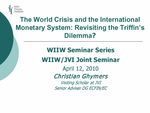The World Crisis and the International Monetary System: Revisiting the Triffin's Dilemma?

Christian Ghymers
presented at: The World Crisis and the International Monetary System: Revisiting the Triffin’s Dilemma (12 Apr 2010)
Any reasonable way to exit successfully from the present world crisis requires understanding the deep roots of the crisis. Most policy makers and academic economists seem to accept that the 'sub-prime' crisis was only an accident in the globalization process, provoked by the bursting of big bubbles with consequent damaging effects, but not so different from the long succession of bubbles that characterizes our economic history. While a great deal has been said regarding financial factors, the specifically monetary factors that triggered the crisis have not yet been afforded the attention they deserve, especially the so-called International Monetary System (IMS) under which monetary policies have been working for decades. It is amazing that economists are not looking more towards these monetary factors and their specific roles before, during and after the crisis. To overlook them prevents us from understanding exactly what has not been working well and, even more worryingly, it would prevent policy makers from being able to escape a new disaster which would be already in preparation. The presentation will try to reconsider the responsibility of the unsatisfactory IMS still based upon the dominant dollar standard, i.e. a national currency. During the 1950s and 1960s Robert Triffin (Yale and Louvain Universities) untiringly explained that such a system was incoherent and condemned to issue an inadequate volume of world liquidities. Although the Bretton Woods 1 collapsed for the foreseen reasons as announced since 1947 by Triffin, and in spite of coordination efforts by the G-5, 7, 8 or 20, the fundamental caveat has been maintained almost unchanged and even a Bretton Woods 2 or 3 emerged. The hypothesis of a 'dollar asymmetry' creating destabilizing macroeconomic waves will be argued along a chronological overview of the IMS since the Bretton Woods 1, and some possible paths for a solution will be explored.
Christian Ghymers, born in Liège, Belgium in 1948, has a Master's Degree from UCL (Louvain, Belgium) and the equivalent of a PhD in International Economics ('Agrégé de l'enseignement supérieur', UCL/ICHEC agreement, Belgium). His experience as an economist amounts to four decades, of which he spent two and a half in the European Commission's DG ECFIN, one in the Research Department of the National Bank of Belgium and the rest as university professor in several universities (Chile, France, and Belgium). He is still Professor with tenure in International Economics at ICHEC, Brussels (Business school). Throughout his career, he has dealt with economic policy issues and institution-building in Europe (close involvement with EMU since the launch of the ERM as well as with economic policy coordination), Latin America (trade reforms, macroeconomic stabilization and crisis, regional integration) and Africa (UEMOA and UEMAC regional integration with a view to improving economic governance). Following his position in ECFIN as Senior Adviser in charge of economic policy surveillance (from 1993 to 2003), he was in charge of communication and information for the DG ECFIN, and is now on secondment from the European Commission to the Joint Vienna Institute as Visiting Scholar.
Christian Ghymers, born in Liège, Belgium in 1948, has a Master's Degree from UCL (Louvain, Belgium) and the equivalent of a PhD in International Economics ('Agrégé de l'enseignement supérieur', UCL/ICHEC agreement, Belgium). His experience as an economist amounts to four decades, of which he spent two and a half in the European Commission's DG ECFIN, one in the Research Department of the National Bank of Belgium and the rest as university professor in several universities (Chile, France, and Belgium). He is still Professor with tenure in International Economics at ICHEC, Brussels (Business school). Throughout his career, he has dealt with economic policy issues and institution-building in Europe (close involvement with EMU since the launch of the ERM as well as with economic policy coordination), Latin America (trade reforms, macroeconomic stabilization and crisis, regional integration) and Africa (UEMOA and UEMAC regional integration with a view to improving economic governance). Following his position in ECFIN as Senior Adviser in charge of economic policy surveillance (from 1993 to 2003), he was in charge of communication and information for the DG ECFIN, and is now on secondment from the European Commission to the Joint Vienna Institute as Visiting Scholar.